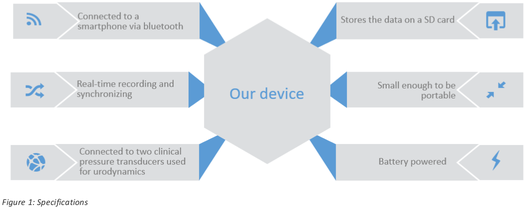Ambulatory Urodynamics
A biomedical engineering student from ULB explores how ambulatory urodynamics can be used for electrostimulation-based neuromodulation for bladder control in the case of neurogenic bladder after SCI.

1 August 2016
Neurogenic bladder is a very common condition resulting from spinal cord injuries (SCI). It mainly consists of frequent detrusor overactivity increasing the bladder pressure and resulting in incontinency. It has been proven that neuromodulation can suppress or reduce this uncontrolled phenomenon.
The final goal of the neuromodulation project is to enable patients to carry an ambulatory neuromodulation system controlled using a smartphone to reduce detrusor overactivity and allow them to maintain continence.
For this, some trials must be undertaken. During these trials, in addition to the neuromodulation device, the pressures taking place inside the bladder and the abdomen will be measured to analyse the effect of the neuromodulation on the detrusor activity.
Portable devices
The aim of the side project is to measure the vesical and abdominal (rectal) pressures to derive the pressure taking place inside the detrusor which is related to its contraction. This must be done using an ambulatory device since the final device will be portable.
The pressures are recorded and converted by a transducer into an electrical voltage. This signal must then be transmitted to a microchip and stored on an SD card before being wirelessly sent to a smartphone to be computed and displayed for analysis.
Here is a summary of the specifications of the device to be constructed:
- Connected to a smartphone via Bluetooth
- Real-time recording and synchronising
- Connected to two clinical pressure transducers used for urodynamics
- Stores data on an SD card
- Small enough to be portable
- Battery powered / USB-chargeable.

Alan Lintermans, MSc in Biomedical Engineering, ULB (Belgium)
 Close
Close

